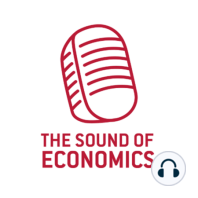14 min listen

S5 Ep28: Backstage: Policy principles for a new social contract
S5 Ep28: Backstage: Policy principles for a new social contract
ratings:
Length:
29 minutes
Released:
Jan 24, 2019
Format:
Podcast episode
Description
**This episode of The Sound of Economics features Bruegel senior fellow Zsolt Darvas in conversation with Maurizio Bussolo and Bernadette Ségol about income inequality in Europe and Central Asia, and the policy principles underpinning a possible new social contract. **
Although income distribution in Europe and Central Asia reaches a fairly egalitarian standard relative to the rest of the world, the current levels of inequality among individuals and households are a major cause of dissatisfaction. In the time of globalisation and rapid technological change, when income inequalities heavily affect people's security and well-being, the demand for a new social contract (and hence welfare state) is apparent. But what would a renewed social contract look like?
In this episode of Bruegel Backstage, senior fellow Zsolt Darvas talks to Maurizio Bussolo, the lead economist for Europe and Central Asia at the World Bank, and Bernadette Ségol, the former secretary general of the European Trade Union Confederation.
The document that brings them together is the recently published World Bank report, [“Towards a New Social Contract: Taking on Distributional Tensions in Europe and Central Asia”](http://documents.worldbank.org/curated/en/569321538150509492/pdf/130299-Toward-a-New-Social-Contract-PUBLIC.pdf), co-written by Maurizio Bussolo. It highlights the shortcomings of the current systems both for taxes and transfers and for labour-market regulation. The report sketches out the policy principles to guide a potential new social contract, principles that assume universal social assistance and insurance, labour protection, and more progressive taxation. If implemented, the report suggests, these measures would improve mobility and flexibility, helping to overcome the inequality traps and provide a broader, more just access to opportunities.
For further reading, you may consider Zsolt Darvas' blog post on [the EU income inequality decline](http://bruegel.org/2018/07/eu-income-inequality-decline-views-from-an-income-shares-perspective/), as well as a publication on [the hardships of achieving the EU's poverty target](http://bruegel.org/2018/03/why-is-it-so-hard-to-reach-the-eus-poverty-target-2/) by the same author.
This podcast was recorded following a Bruegel event, ["Towards a new social contract"](http://bruegel.org/events/towards-a-new-social-contract/) on January 24th 2019.
Although income distribution in Europe and Central Asia reaches a fairly egalitarian standard relative to the rest of the world, the current levels of inequality among individuals and households are a major cause of dissatisfaction. In the time of globalisation and rapid technological change, when income inequalities heavily affect people's security and well-being, the demand for a new social contract (and hence welfare state) is apparent. But what would a renewed social contract look like?
In this episode of Bruegel Backstage, senior fellow Zsolt Darvas talks to Maurizio Bussolo, the lead economist for Europe and Central Asia at the World Bank, and Bernadette Ségol, the former secretary general of the European Trade Union Confederation.
The document that brings them together is the recently published World Bank report, [“Towards a New Social Contract: Taking on Distributional Tensions in Europe and Central Asia”](http://documents.worldbank.org/curated/en/569321538150509492/pdf/130299-Toward-a-New-Social-Contract-PUBLIC.pdf), co-written by Maurizio Bussolo. It highlights the shortcomings of the current systems both for taxes and transfers and for labour-market regulation. The report sketches out the policy principles to guide a potential new social contract, principles that assume universal social assistance and insurance, labour protection, and more progressive taxation. If implemented, the report suggests, these measures would improve mobility and flexibility, helping to overcome the inequality traps and provide a broader, more just access to opportunities.
For further reading, you may consider Zsolt Darvas' blog post on [the EU income inequality decline](http://bruegel.org/2018/07/eu-income-inequality-decline-views-from-an-income-shares-perspective/), as well as a publication on [the hardships of achieving the EU's poverty target](http://bruegel.org/2018/03/why-is-it-so-hard-to-reach-the-eus-poverty-target-2/) by the same author.
This podcast was recorded following a Bruegel event, ["Towards a new social contract"](http://bruegel.org/events/towards-a-new-social-contract/) on January 24th 2019.
Released:
Jan 24, 2019
Format:
Podcast episode
Titles in the series (100)
Opportunities and challenges for EU-China trade relations: In this episode of The Sound of Economics, we focus on trade relations between the EU and China. We asked Alicia Garcia Herrero, Senior Fellow at Bruegel, where relations between China and the EU stand at the moment, and why their trade relations are ... by The Sound of Economics